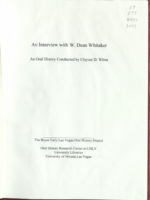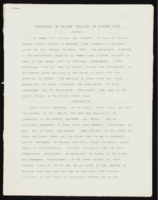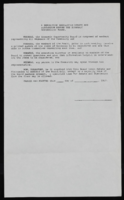Search the Special Collections and Archives Portal
Search Results

Transcript of interview with Rachel Gibson by Kay Long & Caryll Batt Dziedziak, August 25, 1998
Date
Archival Collection
Description
Rachel Gibson was the granddaughter of Nevada pioneers. Her maternal grandparents, George Rammelkamp and Anna Dougherty, were among the earliest white residents of northern Nevada, settling first in Dayton and later Yerington. Her mother, Clara Angelina, and her two aunts, Elizabeth and Georgie, graduated from the University of Nevada at the turn of the century. Clara taught in Yerington for a number of years before marrying Chase Masterson, a dentist. Rachel was born in 1913 in Yerington. The eldest of three children, she continued the tradition of women’s learning and education that began with her mother’s generation. Her 1930 class was the first to graduate from Las Vegas High School, and soon after Rachel moved to California to attend college. Although her father had counseled her to study law, Rachel chose the field of economics. She received her Bachelor’s degree from the University of California at Berkeley, and worked in San Francisco for one year before returning to complete
Text

Ruth J. Kiley interview, January 24, 2013: transcript
Date
Archival Collection
Description
Rancho High School. Moved to Las Vegas in 1957 when she was thirteen. Ruth graduated from Rancho High School and worked with a variety of unions and casinos on their insurance claims
Text

Transcript of interview with Bernice M. Johnson by Dan Buress, February 21, 1979
Date
Archival Collection
Description
On February 21, 1979, Dan Buress interviewed Bernice Johnson (born September 13, 1919 in Los Angeles, California) in her home in Las Vegas, Nevada. The two discuss Mrs. Johnson’s personal history and her reasons for moving to Las Vegas. Johnson describes moving between Southern California and Las Vegas while her husband worked for the railroad company. The interview concludes with Johnson recalling her memories of the Von Tobel family and the rapid population growth in Las Vegas after the construction of the Nevada Test Site.
Text

Transcript of interview with Jackie MacFarlane by Claytee White, February 4, 2010
Date
Archival Collection
Description
Jacqueline "Jackie" Tilman MacFarlane was born in her grandmother's Las Vegas home at H Street and Clark Ave. Her father John Franklin Tilman was a construction worker at Boulder Dam (now Hoover) in early 1930s. Jackie recalls her family having to move several times the Great Depression and living in rural Nevada. Eventually the family came back to reside in Las Vegas. After graduating from high school, she took a waitress job at the Spot Cafe (Main & Charleston) and then at the Askew Drive-In. It was there that she met her future husband, David MacFarlane, an Air Force cadet. David continued to work at Nellis Air force Base as a civilian until he retired in 1987. Jackie describes raising her children in Fair Circle neighborhood during the 1950s and 1960s; a time when Las Vegas was just a "small town of 50,000." She felt safe and always found work in the casinos. Her work career included being a change girl at the Mint of Fremont St. and working as the front office cashier at the Desert Inn and then working at the Sands Hotel and Casino. Eventually she became a night auditor at Sands Hotel and Casino and then at Sahara Hotel and Casino from 1970-1977. She remembers working nightshift, coming home to get the kids and husband off to school and work. After leaving Sahara, she began selling Vanda cosmetics as a home business, something she still does today.
Text

Transcript of interview with John Wanderer by Barbara Tabach, May 9, 2016 and May 18, 2016
Date
Archival Collection
Description
In this interview, Wanderer talks about his first career in auto mechanics and car racing, which developed out of a childhood passion, and eventually took him to Charlotte, North Carolina working for Holman and Moody. He then discusses the decision to move back to Las Vegas with wife, Dorothy (Dottie), to pursue his legal career. Wanderer reflects at length about his mother?s trailblazing legal career, and working with her as legal partners. In addition, Wanderer discusses politics, including his observations from the 2016 Democratic State Convention and running for Democratic Party National Committeeman.
Text

Transcript of interview with Dean Whitaker by Claytee White, April 5, 2010
Date
Archival Collection
Description
William Dean Whitaker was born in 1925 and raised in a suburb of Los Angeles, California. Dean, as he is known, talks briefly about his parents and his brothers, for his youth quickly ended when he joined the Air Force and became an aviation cadet once he had turned 18 years old. The year was 1943 and World War II was raging. He became a member of the 398 th Bomb Group and flew twenty missions before being captured by the Germans. In this oral history, Dean talks with vivid recollection of the day he was captured and details of being a POW in Germany. Among his anecdotes are those of his mother's unwavering belief that he would return home, the humanity of a German soldier, and of meeting Gen. George Patton. Included are photos and excerpts from his personal history of his life during the war. Dean and his wife Lucille moved to Las Vegas in 1990.
Text

Paul M. Lytle interview, March 8, 1995 transcript
Date
Archival Collection
Description
Lytle discusses his birth in Salt Lake City, Utah, his early life in Overton, Nevada, moving around the Southwest United States, and returning to Overton in the early 1930s to work with the Civilian Conservation Corps. Subjects Lytle also talks about in the interview include road and campsite construction at the Valley of Fire State Park, stories about associates and relatives, and being enlisted as a male nurse with the United States Army during World War II. Lastly, Lytle talks about the construction of an exhibit building at Hoover Dam (Boulder Dam) originally used as a headquarters for soldiers during World War II to protect the dam.
Text

Joseph C. Mattingly interview, February 23, 1979: transcript
Date
Archival Collection
Description
On February 23, 1979, collector Sean Powers interviewed Joseph C. Mattingly (born April 21st, 1912 in Texas) at his home in Las Vegas, Nevada. In this interview, Mr. Mattingly discusses working construction on many buildings in the Las Vegas and Henderson areas in Nevada. He also talks about being a member of a motorcycle club and about air conditioning in the early days.
Text

"Stereotypes of Mexicans Projected in Selected Film": manuscript draft by Roosevelt Fitzgerald
Date
Archival Collection
Description
From the Roosevelt Fitzgerald Professional Papers (MS-01082) -- Unpublished manuscripts file.
Text

Economic Opportunity Board of Clark County (Nev.): memos, agendas, and meeting minutes
Date
Archival Collection
Description
From the Clark County Economic Opportunity Board Records -- Series I. Administrative. This folder contains memos, agendas and minutes from meetings of the Clark County Economic Opportunity Board from January 1967 through June 1967.
Text
